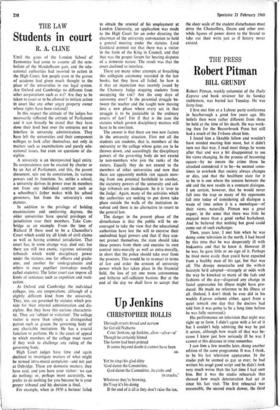Students in court
THE LAW R. A. CLINE
Until the gates of the London School of Economics had come to assume all the sym- bolism of the Mandelbaum gate, and the edu- cational authorities had resorted to action in the High Court, few people even in the groves of academe had given much thought to the place of the universities in our legal system. Are Oxford and Cambridge no different from other corporations such as Kt? Are they to be taken to court or to be allowed to initiate action in court like any other angry property owner whose rights have been violated?
In this respect the attitude of the judges has necessarily reflected the attitude of Parliament and it can broadly be stated that they have done their level best over the centuries not to interfere in university administration. They have left the universities and their component colleges to look after themselves, not only in matters such as examinations and purely edu- cational issues, but even on questions of dis- cipline.
A university is an incorporated legal entity. Its corporateness can be created by charter or by an Act of Parliament, and this, the parent document, sets out its constitution, its various powers and its functions. So, unlike a school, a university derives its power over its members not from any individual contract such as a schoolboy's father makes with his school governors, but from the university's own statutes.
In addition to the privilege of holding examinations and conferring degrees, the older universities have special privileges of jurisdiction over their members. Take Cam- bridge as an example. From the time of Richard II there used to be a Chancellor's Court which could try all kinds of civil claims as well as having criminal jurisdiction. That court has, in some strange way, died out; but there are still two exotic, vigorous university tribunals which wield disciplinary power under the statutes, one for officers and gradu- ates, and another for undergraduates and others in statu pupillari (nowadays usually called students). The latter court can impose all kinds of sentences such as expulsion and rusti- cation.
At Oxford and Cambridge the individual colleges, too, are corporations, although of a slightly different kind from the university. They, too, are governed by statutes which pro- vide for their internal administration and dis- cipline. But they have this curious characteris- tic. They are 'subject to visitation'. The college visitor is more than simply a distinguished patron such as graces the governing body of any charitable institution. He has a crucial function to perform. He is the court of appeal to which members of the college must resort if they wish to challenge any ruling of the governing body.
High Court judges have time and again declined to investigate matters of what might be termed intra-mural complaint—and not just at Oxbridge. These are domestic matters, they have said, and you have your visitor : we can do nothing; or, perhaps more accurately, we prefer to do nothing for you because he is your proper tribunal and his decision is final.
For example, when in 1950 a lecturer failed to obtain the renewal of his employment at London University, an application was made to the High Court for an order directing the chairman of the university convocation to hold a general meeting under the statutes. Lord Goddard pointed out that there was a visitor in the form of the King in Council, and that that was the proper forum for hearing disputes of a domestic nature. The result was that the court declined to interfere.
There are many other attempts at breaching this collegiate autonomy recorded in the law books, but they have all failed. So how is it that an injunction was recently issued by the Chancery Judge stopping students from occupying the LsE? Are the cosy days of autonomy over? Is the perennial struggle be- tween the teacher and the taught now moving into a new phase where every act in that struggle is to be justiciable in the ordinary courts of law? For if that is the case the statutes which govern disciplinary matters will have to be rewritten.
The answer is that there are two new factors in the university situation. First not all the students are students, that is, members of the university or the college whose gates are to be thrown down, and accordingly the disciplinary powers of the governing body do not extend to non-members who join the ranks of the rioters. Equally they do not extend to the members of other universities and now that there are apparently mobile riot squads mov- ing from one potential battlefield to another, the statutory powers of the university and col- lege tribunals are inadequate. So it is 'over to the Judge'. Again, many of the activities which the authorities are seeking to put down take place outside the walls of the institution in- volved and there is no alternative to resort to the general law.
The danger in the present phase of the disturbances is that the public will be en- couraged to take the view that the educational authorities have lost the will to exercise their undoubted legal powers and that if they can- not protect themselves, the state should take these powers from them and exercise its own control intra-murally as well as extra-murally, in short that the police should take over from the proctors. This would be to re-enact in terms of law and order the erosion of university power which has taken place in the financial field, the loss of yet one more autonomous and hitherto self-sufficient bastion. But at the end of the day we shall have to accept that the sheer scale of the student disturbances must drive the Chancellors, Deans and other erst- while figures of power down to the Strand to take out their writs just as if history never existed.


































 Previous page
Previous page